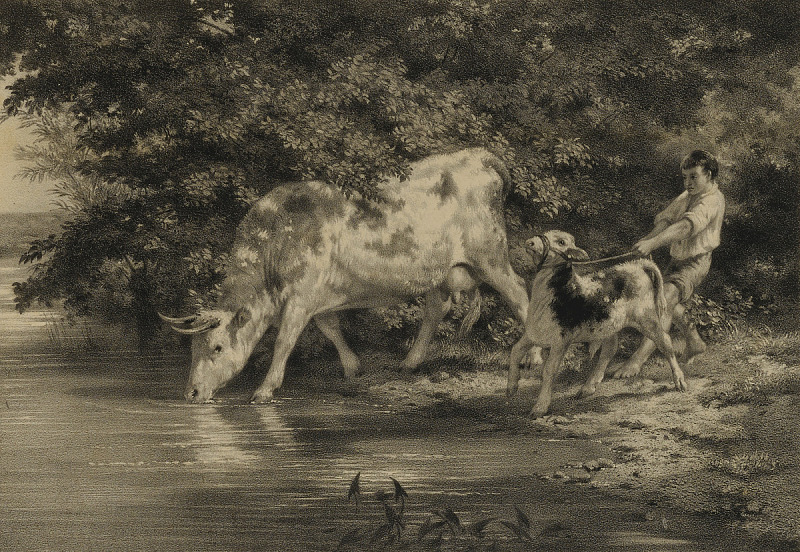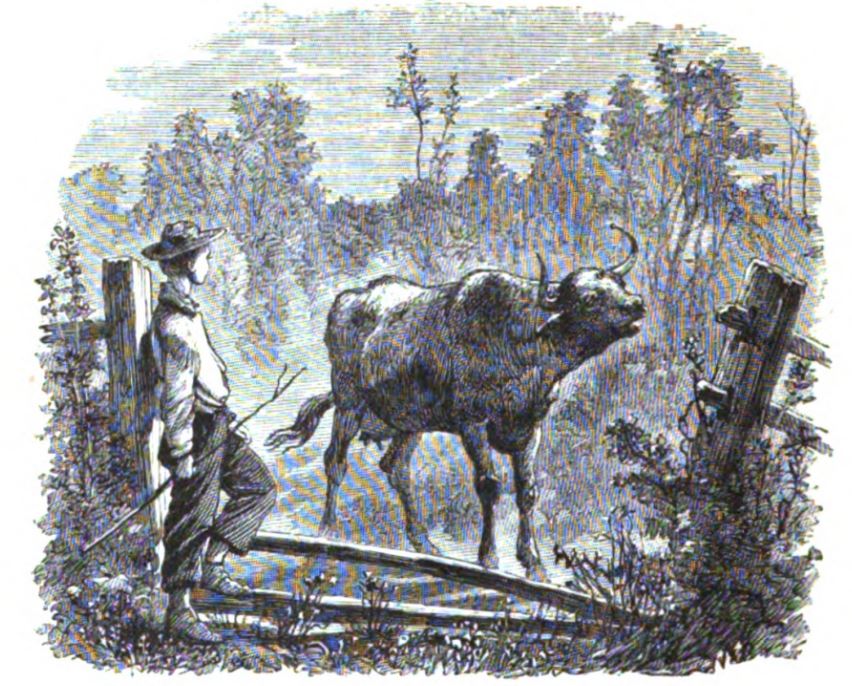The Cow-boy’s Song[1]
By Anna M. Wells
Annotations by Will Smith

Bonheur, lithograph on paper, n.d. Smithsonian American Art Museum and its Renwick
Gallery, Washington, D.C.
"Mooly cow, mooly cow, home from the wood
They sent me to fetch you as fast as I could.
The sun has gone down: it is time to go home.
Mooly cow, mooly cow, why don't you come?
Your udders are full, and the milkmaid is there,
And the children all waiting their supper to share.
I have let the long bars down, — why don't you pass through?"
The mooly cow only said, "Moo-o-o!"
"Mooly cow, mooly cow, have you not been
Regaling all day where the pastures are green?
No doubt it was pleasant, dear mooly, to see
The clear running brook and the wide-spreading tree,
The clover to crop, and the streamlet to wade,
To drink the cool water and lie in the shade;
But now it is night: they are waiting for you."
The mooly cow only said, "Moo-o-o!"
"Mooly cow, mooly cow, where do you go,
When all the green pastures are covered with snow?
You go to the barn, and we feed you with hay,
And the maid goes to milk you there, every day;
She pats you, she loves you, she strokes your sleek hide,
She speaks to you kindly, and sits by your side:
Then come along home, pretty mooly cow, do."
The mooly cow only said, "Moo-o-o!"
"Mooly cow, mooly cow, whisking your tail,
The milkmaid is waiting, I say, with her pail;
She tucks up her petticoats, tidy and neat,
And places the three-legged stool for her seat: —
What can you be staring at, mooly? You know
That we ought to have gone home an hour ago.
How dark it is growing! O, what shall I do?"
The mooly cow only said, "Moo-o-o!"

Wells, Anna M. “The Cow-Boy’s Song.” Our Young Folks: An illustrated magazine for boys and girls 2, No. 8 (August 1866): 466-467.
Contexts
The year of this poem’s publication also saw the official end of the United States Civil War and the creation of the nickel. At this point, the U.S. contained 36 states, with the most recent addition being Nevada in 1864. As is depicted in the poem, children at this time were responsible for helping with often-difficult chores.
Resources for Further Study
- “From Slave Labor to Free Labor” is a digital exhibit exploring the people and politics of the Reconstruction Era.
- “History of Child Labor in the United States” is an overview provided by the U.S. Bureau of Labor Statistics
- “State by State” has information about the number of farms and factories in each state during the Reconstruction era.
[1] The Oxford English Dictionary credits Jonathan Swift with the first usage of the term “cow-boy” in his 1735 poem “A Receipt to Restore Stella’s Youth.” The term referred to “A boy who tends cows” and was originally written as “cow-boy” or “cow boy.”
In Webster’s Little Folks’ Speaker (1875), readers are encouraged to “Give this piece a coaxing tone of voice, and imitate the ‘mooing’ of a cow at the end of each stanza” (40).